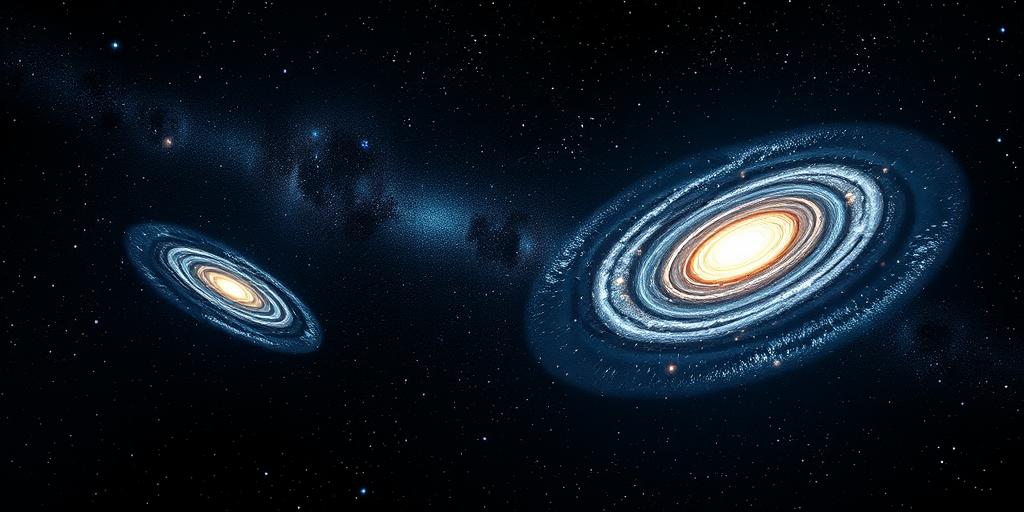Dark Energy: Unveiling the Mystery Behind Cosmic Expansion
For decades, scientists have observed that the universe isn't just expanding, it's accelerating. This surprising discovery has led to the postulation of a mysterious force known as dark energy. But what exactly is dark energy, and how is it driving the expansion of the cosmos?
What is Dark Energy?
Dark energy is a hypothetical form of energy that permeates all of space and exerts a negative pressure, causing the universe to expand at an accelerating rate. Unlike dark matter, which interacts gravitationally but does not emit, absorb, or reflect light, dark energy's presence is inferred solely from its effect on the universe's expansion. As of now, it makes up approximately 68% of the total energy content of the universe, dwarfing ordinary matter (5%) and dark matter (27%).
Evidence for Dark Energy
The primary evidence for dark energy comes from several independent sources:
- Supernovae Observations: Distant Type Ia supernovae appear fainter than expected, suggesting that the universe's expansion has accelerated over time.
- Cosmic Microwave Background (CMB): Analysis of the CMB, the afterglow of the Big Bang, indicates that the universe is geometrically flat. This flatness, combined with the observed amount of ordinary and dark matter, implies the existence of an additional energy component, namely dark energy.
- Large-Scale Structure: The distribution of galaxies on the largest scales is consistent with a universe dominated by dark energy. Dark energy influences the growth of cosmic structures, affecting how galaxies cluster together.
Theories About Dark Energy
The nature of dark energy remains one of the biggest unsolved problems in cosmology. Several theories attempt to explain its origin and properties:
- Cosmological Constant: Proposed by Albert Einstein, the cosmological constant represents a constant energy density that fills space uniformly. It is often associated with the vacuum energy of space itself, arising from quantum fluctuations.
- Quintessence: Unlike the cosmological constant, quintessence is a dynamic, time-evolving field with negative pressure. Its energy density and equation of state can vary over time, making it a more complex explanation for dark energy.
- Modified Gravity: This approach suggests that our understanding of gravity, as described by Einstein's theory of general relativity, is incomplete. Modified gravity theories propose alterations to general relativity that could explain the accelerated expansion without invoking dark energy.
Implications for the Future of the Universe
The dominance of dark energy has profound implications for the future of the universe. If the accelerated expansion continues, the universe will become increasingly empty and cold. Galaxies will drift further apart, and eventually, the observable universe will consist only of our local group of galaxies.
- Heat Death: The accelerated expansion driven by dark energy could lead to a scenario known as the "heat death" of the universe, where all energy is evenly distributed, and no further work can be done.
- Big Rip: Alternatively, if the density of dark energy increases over time, it could lead to a "Big Rip," where the expansion becomes so rapid that it tears apart all structures in the universe, including galaxies, stars, and even atoms.
Ongoing Research and Future Missions
Scientists are actively working to unravel the mysteries of dark energy through various observational and theoretical efforts. Future missions, such as the Euclid spacecraft and the Vera C. Rubin Observatory, aim to provide more precise measurements of the universe's expansion history and large-scale structure. These observations will help distinguish between different dark energy models and shed light on the ultimate fate of the universe.
Conclusion
Dark energy remains one of the most enigmatic phenomena in modern cosmology. Its existence is supported by a wealth of observational evidence, but its true nature remains a mystery. Understanding dark energy is crucial for comprehending the past, present, and future of the universe. As we continue to explore the cosmos, we can hope to unlock the secrets of this elusive force and gain deeper insights into the workings of the universe.









